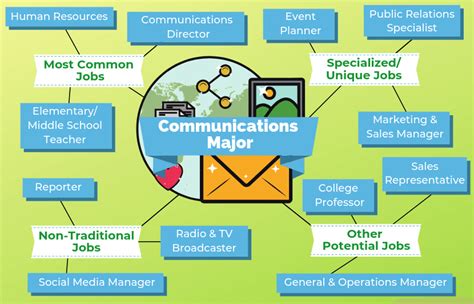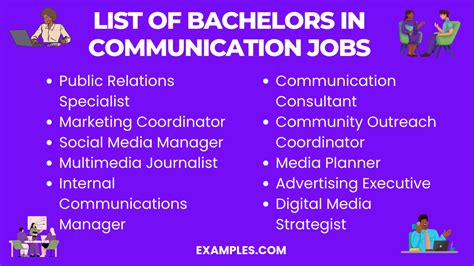Comm Careers

Communication careers are diverse and encompass a wide range of industries and specializations. Effective communication is a vital skill in today's world, and professionals in this field play a crucial role in facilitating connections, sharing information, and driving successful outcomes. From journalism to public relations, marketing to broadcasting, the realm of communication careers offers a wealth of opportunities for those with a passion for words, ideas, and strategic messaging.
Exploring the World of Communication Careers

The communication industry is a dynamic and ever-evolving field, offering a multitude of career paths for individuals with diverse skill sets and interests. Whether you thrive in the fast-paced world of media, find fulfillment in crafting compelling narratives, or excel at building and maintaining positive brand images, there’s a communication career that aligns with your unique talents and aspirations.
Journalism: The Art of Storytelling
Journalism is a cornerstone of communication careers, focusing on the collection, verification, and dissemination of information to the public. Journalists play a pivotal role in society by keeping citizens informed about local, national, and global events, issues, and trends. They are the guardians of truth, ensuring that the public has access to accurate and reliable news.
Within the realm of journalism, there are numerous specializations to explore, each offering unique challenges and opportunities. Here's a glimpse into some of the most prominent paths:
- Print Journalism: This traditional form of journalism involves writing for newspapers, magazines, and other print publications. Print journalists are skilled in crafting engaging stories, conducting in-depth research, and meeting tight deadlines.
- Broadcast Journalism: Broadcasting journalists bring news to life through television and radio. They excel at delivering compelling narratives, often in a fast-paced and dynamic environment, and may specialize in areas like sports, weather, or political reporting.
- Online Journalism: With the rise of digital media, online journalism has become a dominant force. Online journalists work across various platforms, including websites, blogs, and social media, to deliver news and information to a global audience.
- Investigative Journalism: This specialization focuses on uncovering and exposing hidden truths, often involving extensive research and digging beneath the surface to bring critical issues to light.
Journalism careers require a unique blend of skills, including exceptional writing and communication abilities, a strong sense of ethics, and an unwavering commitment to accuracy and fairness. Journalists often work under pressure, meeting tight deadlines and navigating complex ethical dilemmas to deliver high-quality, impactful stories.
| Journalism Specialization | Key Skills |
|---|---|
| Print Journalism | Writing, research, editing |
| Broadcast Journalism | Storytelling, presentation skills, multimedia production |
| Online Journalism | Digital media proficiency, SEO knowledge, social media expertise |
| Investigative Journalism | In-depth research, interviewing, data analysis |

Public Relations: Building Positive Images
Public relations (PR) professionals are the architects of positive brand images. They work closely with organizations, businesses, and individuals to manage their public perception and build strong relationships with key stakeholders, including the media, customers, and the general public.
PR careers involve a range of strategic communication activities, including:
- Media Relations: PR specialists build and maintain relationships with journalists and media outlets to ensure their clients receive favorable coverage.
- Crisis Communication: In times of crisis, PR professionals step in to manage the narrative, minimize damage to their client's reputation, and restore public trust.
- Community Engagement: PR careers often involve connecting with local communities, organizing events, and fostering positive relationships.
- Social Media Management: With the rise of digital platforms, PR specialists play a crucial role in crafting and executing social media strategies to engage audiences and enhance brand reputation.
A successful career in public relations requires a deep understanding of human psychology, strategic thinking, and excellent communication skills. PR professionals must be adept at anticipating potential issues, crafting compelling narratives, and building trust with diverse audiences.
| PR Specialization | Key Skills |
|---|---|
| Media Relations | Journalism knowledge, media database management, pitch writing |
| Crisis Communication | Crisis management training, strategic planning, strong decision-making skills |
| Community Engagement | Event planning, community outreach, relationship building |
| Social Media Management | Digital marketing expertise, content creation, analytics interpretation |
Marketing: The Art of Persuasion
Marketing professionals are the driving force behind successful business strategies, focusing on understanding consumer behavior and creating persuasive messages to drive sales and build brand loyalty.
Marketing careers offer a wealth of opportunities, including:
- Brand Management: Brand managers are responsible for crafting and maintaining a brand's identity, ensuring it resonates with the target audience and drives business growth.
- Digital Marketing: In today's digital age, digital marketers play a crucial role in leveraging online platforms to reach and engage customers, using strategies like search engine optimization (SEO), social media marketing, and email campaigns.
- Market Research: Market researchers gather and analyze data to understand consumer trends, preferences, and behaviors, providing insights that inform marketing strategies.
- Advertising: Advertising professionals create and place ads across various media channels to promote products, services, or ideas.
A career in marketing demands creativity, analytical thinking, and a deep understanding of consumer psychology. Marketers must be able to adapt to changing trends and technologies while crafting compelling narratives that resonate with their target audience.
| Marketing Specialization | Key Skills |
|---|---|
| Brand Management | Brand strategy development, creative thinking, market analysis |
| Digital Marketing | SEO expertise, social media proficiency, content creation skills |
| Market Research | Data analysis, survey design, consumer behavior understanding |
| Advertising | Creative writing, media planning, advertising campaign management |
Broadcasting: Bringing Stories to Life
Broadcasting careers involve bringing stories to life through television, radio, and other multimedia platforms. Broadcasters play a vital role in entertainment, news, and sports industries, captivating audiences with their storytelling skills and engaging personalities.
Here's a glimpse into some of the key roles in broadcasting:
- Anchor/Host: Anchors and hosts are the face and voice of news or entertainment programs, delivering information or leading discussions with a blend of expertise and charisma.
- Reporter: Reporters gather and deliver news stories, often working in the field to conduct interviews, gather footage, and provide real-time updates.
- Producer: Producers are the behind-the-scenes maestros, responsible for planning, organizing, and overseeing the creation of broadcast content, ensuring smooth production and high-quality output.
- Technical Roles: Broadcasting careers also encompass a range of technical roles, including camera operators, audio engineers, and editors, who ensure that the final product is technically flawless.
A successful broadcasting career demands exceptional communication skills, a deep understanding of the target audience, and the ability to work under pressure. Broadcasters must be versatile, adapting to different formats and genres, and often need to think on their feet to deliver engaging content.
| Broadcasting Specialization | Key Skills |
|---|---|
| Anchor/Host | Presentation skills, storytelling ability, confidence |
| Reporter | Interviewing skills, news judgment, multimedia production |
| Producer | Project management, creative vision, attention to detail |
| Technical Roles | Technical proficiency, problem-solving skills, attention to detail |
The Impact of Communication Careers

Communication careers have a profound impact on society, shaping public opinion, influencing decision-making, and driving social change. Whether it’s a journalist exposing a critical issue, a PR specialist rebuilding trust after a crisis, or a marketer crafting a persuasive campaign, communication professionals play a vital role in shaping the world we live in.
In today's fast-paced and interconnected world, the demand for skilled communicators is higher than ever. As technology continues to evolve, communication careers will adapt and innovate, offering new and exciting opportunities for those with a passion for words, ideas, and strategic messaging. From the newsroom to the boardroom, the communication industry is a dynamic and rewarding field, offering a wealth of possibilities for those who dare to explore and embrace its diverse paths.
Future Trends in Communication Careers
The communication landscape is continually evolving, and professionals in this field must stay abreast of emerging trends to remain competitive and relevant. Here’s a glimpse into some of the key trends shaping the future of communication careers:
- Digital Transformation: The digital revolution has reshaped the communication industry, and this trend is set to continue. From online journalism to digital marketing, professionals must embrace digital platforms and tools to reach and engage audiences effectively.
- Data-Driven Strategies: With the abundance of data available, communication careers are becoming increasingly data-driven. Marketers, journalists, and PR specialists are leveraging analytics to make informed decisions and craft more effective strategies.
- Content Marketing: Content is king in today's communication landscape. Whether it's through blogs, videos, podcasts, or social media posts, professionals are focusing on creating valuable, relevant, and engaging content to build trust and foster long-term relationships with audiences.
- Influencer Collaboration: The rise of social media influencers has created a new avenue for communication careers. Brands and organizations are partnering with influencers to reach targeted audiences and build credibility.
- Diversity and Inclusion: The communication industry is recognizing the importance of diversity and inclusion, both in terms of the stories being told and the teams crafting those stories. Embracing diverse perspectives and voices is becoming a key focus for many organizations.
As the communication landscape continues to evolve, professionals must remain adaptable and willing to learn new skills. Continuous learning and a commitment to staying updated with industry trends are essential for long-term success in this dynamic field.
Educational Pathways and Skills Development
A solid educational foundation is crucial for a successful career in communication. While specific requirements may vary depending on the specialization, here are some key considerations:
- Journalism: Many journalists pursue a bachelor's degree in journalism, mass communication, or a related field. Courses often cover reporting, writing, editing, ethics, and multimedia production.
- Public Relations: A bachelor's degree in public relations, communications, or a related field is typically required. Courses may include media relations, crisis communication, event planning, and social media strategy.
- Marketing: Marketing careers often require a bachelor's degree in marketing, business administration, or a related field. Courses cover market research, advertising, branding, and digital marketing.
- Broadcasting: Broadcasting careers may require a degree in broadcasting, communications, or a related field. Courses often include media production, broadcasting law and ethics, and multimedia storytelling.
In addition to formal education, gaining practical experience through internships, freelance work, or volunteer opportunities is invaluable for building a strong portfolio and developing key skills. Networking within the industry and staying connected with alumni and professionals can also open doors to new opportunities.
Conclusion: Embracing the Power of Communication
Communication careers offer a world of opportunities for those with a passion for storytelling, strategic messaging, and building connections. From journalism to public relations, marketing to broadcasting, the communication industry is a dynamic and rewarding field, shaping the way we perceive and interact with the world around us.
As we navigate the evolving landscape of communication, embracing new technologies, data-driven strategies, and diverse perspectives, we open doors to endless possibilities. With a commitment to continuous learning, ethical practices, and a deep understanding of human connection, communication professionals can drive meaningful change and leave a lasting impact on society.
What are the key skills needed for a successful career in communication?
+
Successful communication careers demand a unique blend of skills, including exceptional writing and communication abilities, a deep understanding of human psychology, strategic thinking, and the ability to adapt to changing trends and technologies. Additionally, ethical practices, a commitment to accuracy and fairness, and a passion for storytelling are crucial for making a meaningful impact.
How can I break into the competitive field of journalism?
+
Breaking into journalism requires a combination of formal education, practical experience, and a strong portfolio. Consider pursuing a degree in journalism or a related field, gaining hands-on experience through internships or freelance work, and building a robust portfolio of published clips. Networking within the industry and staying connected with alumni and professionals can also open doors to new opportunities.
What role does digital marketing play in modern communication careers?
+
Digital marketing has become a cornerstone of modern communication careers, especially in fields like public relations and marketing. Professionals in these fields must have a strong grasp of digital platforms, SEO, social media strategies, and content creation to effectively reach and engage audiences in the digital age.
How can I stay updated with the latest trends in communication careers?
+
Staying updated with the latest trends is crucial for long-term success in communication careers. Attend industry conferences and workshops, follow thought leaders and publications in your field, and actively participate in online communities and forums. Additionally, consider enrolling in continuing education courses or certifications to enhance your skills and stay ahead of the curve.



